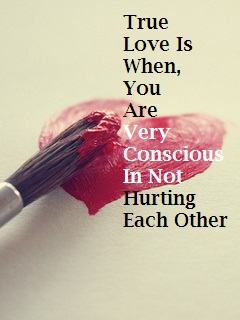To become a Buddha is to grow
from conditioned love of one or a few
to unconditioned love of not more but all.
 Similarly, the feeling of being in love is usually more a form of attachment, based on mental projections and fantasies, than true altruistic love. The best evidence of this is that once these projections change, the feeling disappears and sometimes turns into its opposite. Desire can be so strong that the one to whom we are attached appears to us to be free from defects, even if they really have a lot, and at the same time, we exaggerate their qualities. Such distortions of reality are signs that our love is motivated more by our personal needs than a real concern for others.
Similarly, the feeling of being in love is usually more a form of attachment, based on mental projections and fantasies, than true altruistic love. The best evidence of this is that once these projections change, the feeling disappears and sometimes turns into its opposite. Desire can be so strong that the one to whom we are attached appears to us to be free from defects, even if they really have a lot, and at the same time, we exaggerate their qualities. Such distortions of reality are signs that our love is motivated more by our personal needs than a real concern for others.
It is possible to experience a love without partiality. It should not come from a simple emotional reaction; it should be based on reflection and lead to a firm commitment. Then it will no longer depend on how others treat us. The goal of the Buddhist practitioner is to cultivate this kind of love, sincerely wishing happiness to all beings in the universe. This is obviously not easy.
Let us reason like this. Whether others are beautiful or ugly, benevolent or cruel, they are all sentient beings like us. And like us, they want to be happy and not suffer, which is their right, just like us. Recognising that all beings are equal in their aspirations and their right to happiness, we feel a sense of empathy that brings us closer to them. As we get accustomed to this impartial altruism, we finally experience a sense of universal responsibility.
– The 14th Dalai Lama, Tenzin Gyatso
On The Path To Enlightenment: Heart Advice From The Great Tibetan Masters
Compiled By Matthieu Ricard





